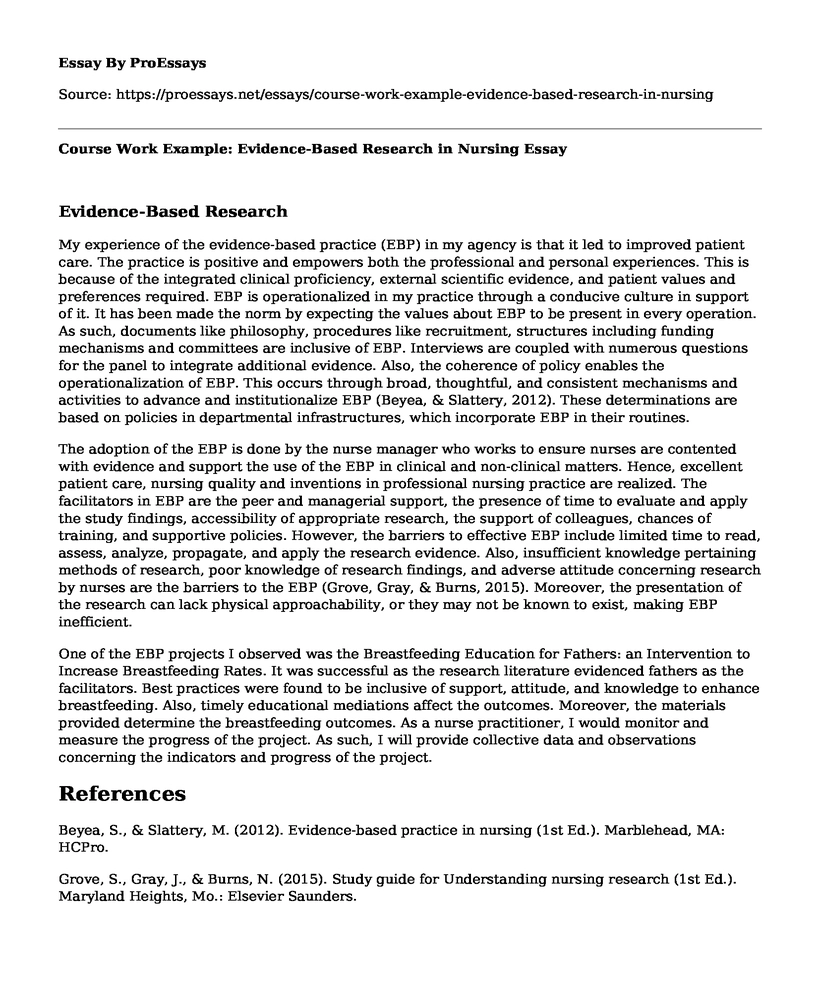Evidence-Based Research
My experience of the evidence-based practice (EBP) in my agency is that it led to improved patient care. The practice is positive and empowers both the professional and personal experiences. This is because of the integrated clinical proficiency, external scientific evidence, and patient values and preferences required. EBP is operationalized in my practice through a conducive culture in support of it. It has been made the norm by expecting the values about EBP to be present in every operation. As such, documents like philosophy, procedures like recruitment, structures including funding mechanisms and committees are inclusive of EBP. Interviews are coupled with numerous questions for the panel to integrate additional evidence. Also, the coherence of policy enables the operationalization of EBP. This occurs through broad, thoughtful, and consistent mechanisms and activities to advance and institutionalize EBP (Beyea, & Slattery, 2012). These determinations are based on policies in departmental infrastructures, which incorporate EBP in their routines.
The adoption of the EBP is done by the nurse manager who works to ensure nurses are contented with evidence and support the use of the EBP in clinical and non-clinical matters. Hence, excellent patient care, nursing quality and inventions in professional nursing practice are realized. The facilitators in EBP are the peer and managerial support, the presence of time to evaluate and apply the study findings, accessibility of appropriate research, the support of colleagues, chances of training, and supportive policies. However, the barriers to effective EBP include limited time to read, assess, analyze, propagate, and apply the research evidence. Also, insufficient knowledge pertaining methods of research, poor knowledge of research findings, and adverse attitude concerning research by nurses are the barriers to the EBP (Grove, Gray, & Burns, 2015). Moreover, the presentation of the research can lack physical approachability, or they may not be known to exist, making EBP inefficient.
One of the EBP projects I observed was the Breastfeeding Education for Fathers: an Intervention to Increase Breastfeeding Rates. It was successful as the research literature evidenced fathers as the facilitators. Best practices were found to be inclusive of support, attitude, and knowledge to enhance breastfeeding. Also, timely educational mediations affect the outcomes. Moreover, the materials provided determine the breastfeeding outcomes. As a nurse practitioner, I would monitor and measure the progress of the project. As such, I will provide collective data and observations concerning the indicators and progress of the project.
References
Beyea, S., & Slattery, M. (2012). Evidence-based practice in nursing (1st Ed.). Marblehead, MA: HCPro.
Grove, S., Gray, J., & Burns, N. (2015). Study guide for Understanding nursing research (1st Ed.). Maryland Heights, Mo.: Elsevier Saunders.
Cite this page
Course Work Example: Evidence-Based Research in Nursing. (2021, Jul 17). Retrieved from https://proessays.net/essays/course-work-example-evidence-based-research-in-nursing
If you are the original author of this essay and no longer wish to have it published on the ProEssays website, please click below to request its removal:
- HR Management Essay Example: Coaching Model for a Low-Performing Nurse
- Objection to Medical Assistance in Dying Essay
- Descriptive Epidemiology Paper Example
- Essay Sample on Abortion: The Debate on Reproductive Health and Rights
- Essay on the Importance of Proper Nutrition for Food Security & Health
- Essay Example on Difference Between Quality Improvement & Quality Assurance
- Free Report Sample on Strategic Planning: Internal & External Environmental Analysis







